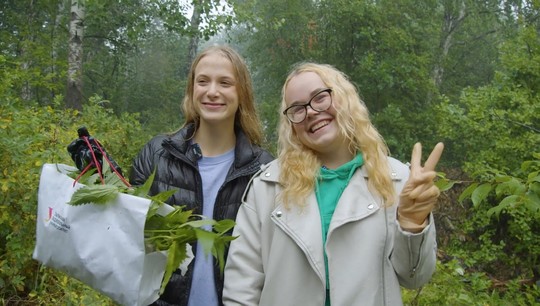Ural Federal University Scholars Cut Nettles and Bird Cherry at the University’s Biological Station
The participants of the science reality show “Laboratorka” visited the Biostation of the Institute of Natural Sciences and Mathematics of the Ural Federal University. There they collected samples of stinging nettle (Urtica) and bird cherry (Prunus padus). On the basis of plants they will create cosmetics with useful properties – healing, antiseptic and antioxidant. They will present the result to a panel of scientists who will evaluate the scientific and practical component of the product.
“Bird cherry berries contain tannins, phytoncides, which have antibacterial properties, and anthocyanins – a crystal violet that helps reduce inflammation and oxidative stress. For example, blueberries contain a large amount of anthocyanins, which can be used not only to maintain eyesight, but also to reduce the risk of certain diseases,” says Aleksandr Ermoshin, the curator of the project, Senior Researcher at the UrFU Research Laboratory “Biotechnology of Components Maintenance and Restoration of Natural and Transformed Biosystems”.
For example, nettle juice contains substances such as histamine, formic acid, vitamins K, C and others. However, a large number of samples are needed to extract and study useful substances, the biologist adds.
“The fact is that secondary metabolites that have a biological effect are poorly concentrated in plants. To get a sufficiently large amount of useful substances, it is necessary to collect at least 100-200 grams of dry matter of nettle leaves, or almost a kilogram of raw weight,” explains Aleksandr Ermoshin.
High school students will dry the samples and extract the beneficial properties using special equipment in the lab.
The main roles in “Laboratorka” are played by school students who have shown an interest in science at an early age. They are supported by experienced mentors who have done a lot of serious scientific research: Aleksandr Ermoshin and Ivan Zhidkov, Head of the Laboratory of Photovoltaic Materials at the UrFU. The peculiarity of the show is that the participants talk about complex things in simple language and clearly show what scientists can do.
The reality show about the scientific adventures of Ekaterinburg schoolchildren will last all summer, with new episodes being released once a week.

